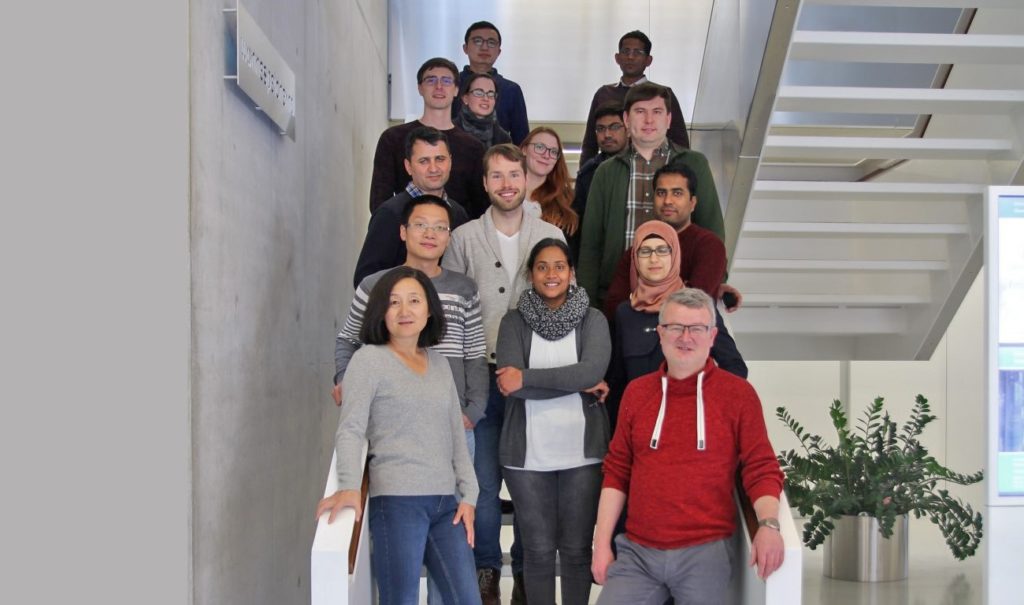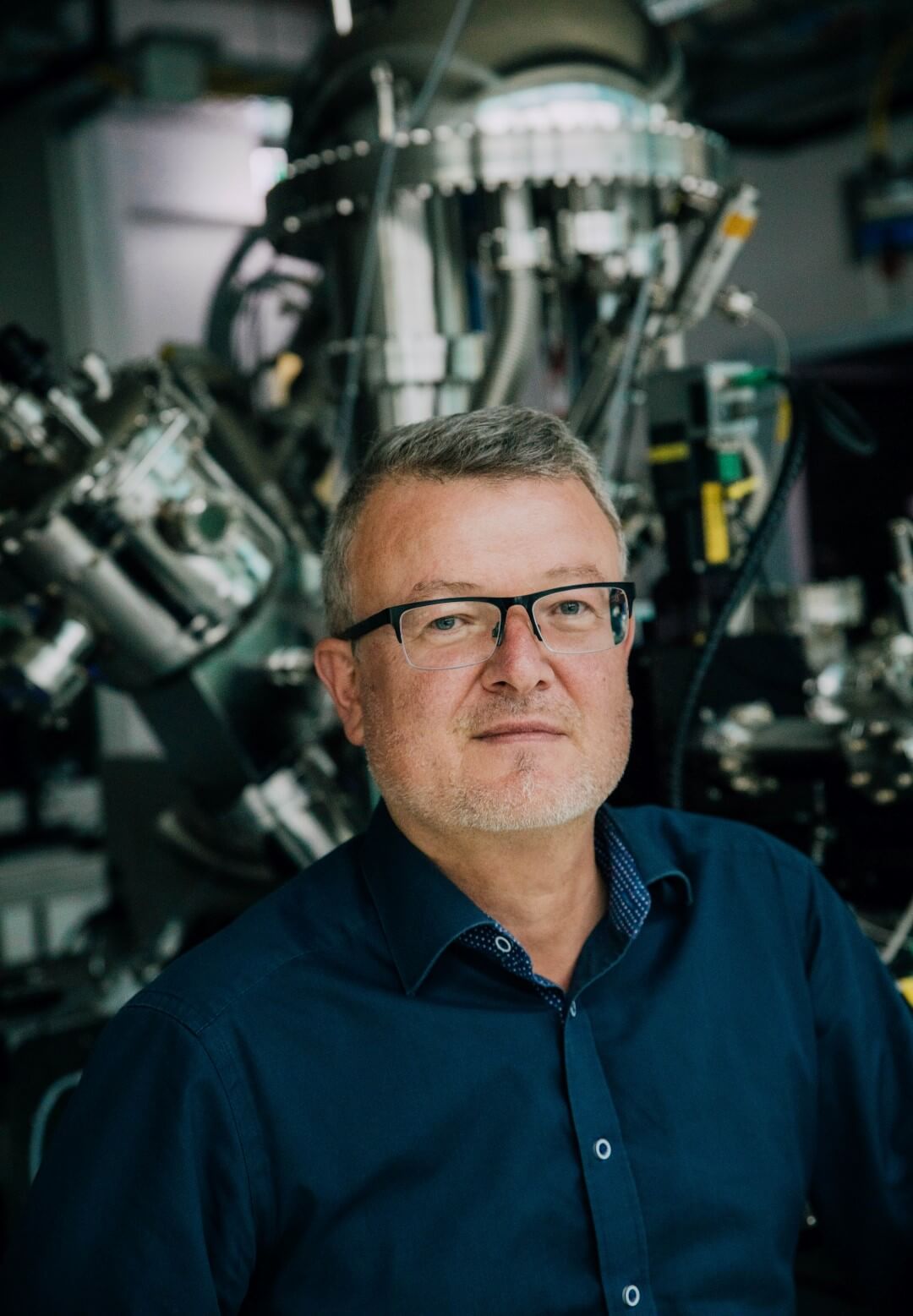HIU-Newsletter
You a scientist yourself? A journalist, a political decision-maker or business representative? In our newsletters we compile the latest battery research news for you. Specially tailored to your personal area of interest.
The HIU research group Solid State Chemistry is an interdisciplinary group in which chemists, physicists, and engineers are active. The focus of their research is on the battery systems to come after the lithium-ion ones, referred to simply as "batteries beyond lithium". Parallel to this work, new and alternative approaches are being developed to overcome the obstacles to lithium-free batteries.
Although lithium-ion batteries are widely used, their storage capacity is limited. In the future, battery systems with higher energy density will be needed, in particular for electromobility. These batteries will need the capacity to store more electrical energy at a lower weight. Lithium-free batteries will also be needed in the future that possess a markedly higher storage capacity and improved safety features.
This work should lay the cornerstone for innovative and more powerful batteries. One object of study is the potential of various battery materials to raise the energy density of today’s battery systems. Current examples of this are the fluoride-ion and chloride-ion batteries, both of which have the potential for significantly exceeding the storage capacity of the lithium-ion battery.
Another object of current research is the magnesium battery, which also exhibits a relatively high energy density. This research group is also involved in the development of active materials (e.g., electrode materials). One feature that has priority here is the issue of safety.
New anode and cathode materials made of nanocomposites are also being developed and tested in order to make electrochemical energy storage units more efficient.

We have demonstrated the first reversibly working battery cells based on fluoride shuttle. In secondary fluoride batteries, fluoride anion acts as charge transfer ion between a metal/ metal fluoride pair where it will react with metal or evolve from metal fluoride depending on the flow of current. The theoretical capacity can be several times higher than that of conventional Lithium Ion Batteries, depending on the combination of metal and metal Fluoride.
(images will be uploaded shortly)
The Cluster of Excellence POLiS investigates new battery materials and technology concepts for efficient and sustainable storage of electrical energy. The Cluster aims at developing electrode materials and electrolytes that allow for sustainable systems based on Sodium, Magnesium, Calcium, Aluminium, and Clorine ions. Major obstacles for the development and use of post-lithium systems and thus the legitimation for our research are: (1) Low ionic mobility in solids and liquids, (2) Lack of well-designed materials interfaces with suitable charge transfer properties, (3) Degradation of active materials and electrolyte, and (4) Lack of reversibility of charge- and discharge processes.
https://www.postlithiumstorage.org/
CELEST pools the know-how of 31 institutes of its partner institutions: Karlsruhe Institute of Technology (KIT), Ulm University, and the Center for Solar Energy and Hydrogen Research Baden-Württemberg (ZSW). CELEST is aiming at enhancing communication and cooperation among the scientists involved and will pave the way for new, interdisciplinary collaborations. CELEST coordinates joint activities with other universities and research institutions as well as with industry in Germany and abroad.
Forscher aus fünf europäischen Forschungsinstituten (das HIU, die französische Alternative Energie- und Atomenergiekommission CEA, die Technische Universität Dänemark DTU, die schwedische Universität Uppsala und das slowenische Kemijski Institut NKI arbeiten gemeinsam im EU-finanzierten Projekt “LiRichFCC” Li-Ionen-Batterien zusammen. Auf der Grundlage eines neuen Konzeptes von Li-reichen Salzgesteinsstrukturen lassen sich Energiespeicherdichten über die bisher bekannten System hinaus erhöhen.
Das Projekt ist eine Kooperation zwischen dem HIU, dem DLR Stuttgart, der FhG-ISIT, CustomCells GmbH, der El-Cell GmbH und der Schaeffler AG mit dem Ziel, die Magnesium-Sulfur-Technologie auf Demonstrationsebene zu betreiben. Das technische Ziel ist die Herstellung und Prüfung von 20 Ah Mg-S Zellen.
Titel: “Novel in situ and in operando techniques for characterization of interfaces in electrochemical storage systems”. 8 Partner aus DK, UK, F, D mit assoziierten Partnern aus Korea and USA. Gemeinsam arbeiten die Projektpartner an internen und externen Grenzflächen von Batteriematerialien.
ProEco ist eine gemeinschafliches Projekt für Nanomaterialien für Anwendungen im Bereich der Energiespeicherung. Partner sind: DTU Energy Conversion, Aarhus University inano, Danish Technological Institute, Haldar Topsoe AS, Topsoe Fuel Cells, MPI für Kolloid und Grenzflächenforschung und KIT.
Das Projekt beschäftigt sich mit neuen Batteriematerialien basierend auf Magnesium-Nanomaterialien für angewandte, wieder aufladbare Batterien. Partner des Projekts sind: CNRS-ICMP France, KIT Germany, IFE Norway, RAS IPCP Russia, MSU Russia, St. Peterburg Univ. Russia, ISSP Russia
Das Projekthaus e-drive ist eine strategische Allianz mit Daimler zum Thema Elektromobilität bzw. Elektroantriebe.
Die Allianz Projekthaus e-drive
CUSTOMCELLS® is one of the world’s leading companies in the development of special lithium-ion battery cells. CUSTOMCELLS® – Made in Germany – develops and produces application-specific battery cells from prototypes to small and medium series. On the basis of flexible manufacturing concepts and state-of-the-art research and production facilities, CUSTOMCELLS® guarantees high-tech solutions for special applications and – depending on the customer requirement profile – tailor-made development and production of electrodes, electrolytes, battery cells and battery modules. With access to 14 industrialized electrode technologies, over 250 raw materials in stock and a production facility equipped with state-of-the-art electrode and cell manufacturing machines, CUSTOMCELLS® is one of the leading manufacturers of customized battery cells.
We have demonstrated the first reversibly working battery cells based on fluoride shuttle. In secondary fluoride batteries, fluoride anion acts as charge transfer ion between a metal/ metal fluoride pair where it will react with metal or evolve from metal fluoride depending on the flow of current. The theoretical capacity can be several times higher than that of conventional Lithium Ion Batteries, depending on the combination of metal and metal Fluoride.
(images will be uploaded shortly)
The Cluster of Excellence POLiS investigates new battery materials and technology concepts for efficient and sustainable storage of electrical energy. The Cluster aims at developing electrode materials and electrolytes that allow for sustainable systems based on Sodium, Magnesium, Calcium, Aluminium, and Clorine ions. Major obstacles for the development and use of post-lithium systems and thus the legitimation for our research are: (1) Low ionic mobility in solids and liquids, (2) Lack of well-designed materials interfaces with suitable charge transfer properties, (3) Degradation of active materials and electrolyte, and (4) Lack of reversibility of charge- and discharge processes.
https://www.postlithiumstorage.org/
CELEST pools the know-how of 31 institutes of its partner institutions: Karlsruhe Institute of Technology (KIT), Ulm University, and the Center for Solar Energy and Hydrogen Research Baden-Württemberg (ZSW). CELEST is aiming at enhancing communication and cooperation among the scientists involved and will pave the way for new, interdisciplinary collaborations. CELEST coordinates joint activities with other universities and research institutions as well as with industry in Germany and abroad.
Forscher aus fünf europäischen Forschungsinstituten (das HIU, die französische Alternative Energie- und Atomenergiekommission CEA, die Technische Universität Dänemark DTU, die schwedische Universität Uppsala und das slowenische Kemijski Institut NKI arbeiten gemeinsam im EU-finanzierten Projekt “LiRichFCC” Li-Ionen-Batterien zusammen. Auf der Grundlage eines neuen Konzeptes von Li-reichen Salzgesteinsstrukturen lassen sich Energiespeicherdichten über die bisher bekannten System hinaus erhöhen.
Das Projekt ist eine Kooperation zwischen dem HIU, dem DLR Stuttgart, der FhG-ISIT, CustomCells GmbH, der El-Cell GmbH und der Schaeffler AG mit dem Ziel, die Magnesium-Sulfur-Technologie auf Demonstrationsebene zu betreiben. Das technische Ziel ist die Herstellung und Prüfung von 20 Ah Mg-S Zellen.
Titel: “Novel in situ and in operando techniques for characterization of interfaces in electrochemical storage systems”. 8 Partner aus DK, UK, F, D mit assoziierten Partnern aus Korea and USA. Gemeinsam arbeiten die Projektpartner an internen und externen Grenzflächen von Batteriematerialien.
ProEco ist eine gemeinschafliches Projekt für Nanomaterialien für Anwendungen im Bereich der Energiespeicherung. Partner sind: DTU Energy Conversion, Aarhus University inano, Danish Technological Institute, Haldar Topsoe AS, Topsoe Fuel Cells, MPI für Kolloid und Grenzflächenforschung und KIT.
Das Projekt beschäftigt sich mit neuen Batteriematerialien basierend auf Magnesium-Nanomaterialien für angewandte, wieder aufladbare Batterien. Partner des Projekts sind: CNRS-ICMP France, KIT Germany, IFE Norway, RAS IPCP Russia, MSU Russia, St. Peterburg Univ. Russia, ISSP Russia
Das Projekthaus e-drive ist eine strategische Allianz mit Daimler zum Thema Elektromobilität bzw. Elektroantriebe.
Die Allianz Projekthaus e-drive
CUSTOMCELLS® is one of the world’s leading companies in the development of special lithium-ion battery cells. CUSTOMCELLS® – Made in Germany – develops and produces application-specific battery cells from prototypes to small and medium series. On the basis of flexible manufacturing concepts and state-of-the-art research and production facilities, CUSTOMCELLS® guarantees high-tech solutions for special applications and – depending on the customer requirement profile – tailor-made development and production of electrodes, electrolytes, battery cells and battery modules. With access to 14 industrialized electrode technologies, over 250 raw materials in stock and a production facility equipped with state-of-the-art electrode and cell manufacturing machines, CUSTOMCELLS® is one of the leading manufacturers of customized battery cells.
 Prof. Dr. Maximilian Fichtner Solid-State Chemistry
Prof. Dr. Maximilian Fichtner Solid-State ChemistryORCID: 0000-0002-7127-1823
SciProfiles: 2385097
ResearcherID: A-4731-2013
Scopus Author ID: 6701819223
Katja Vetter
Office Prof. Dr Maximilian Fichtner
Tel: +49 (0731) 50 34020
Mail: katja.vetter@kit.edu
You a scientist yourself? A journalist, a political decision-maker or business representative? In our newsletters we compile the latest battery research news for you. Specially tailored to your personal area of interest.